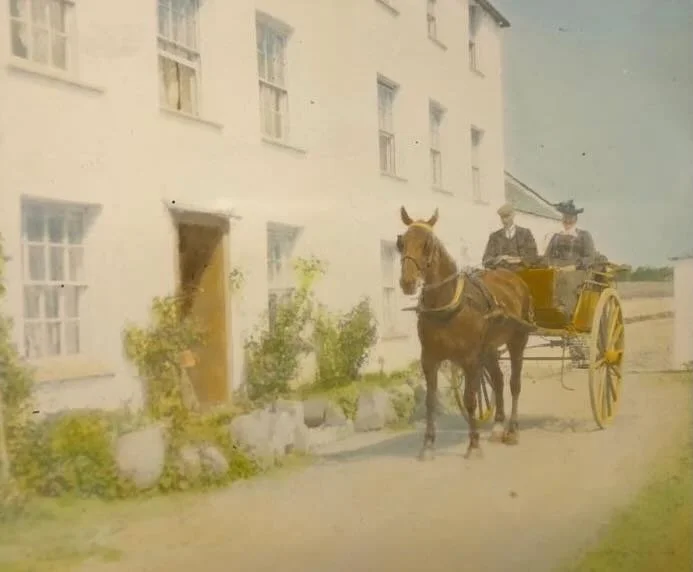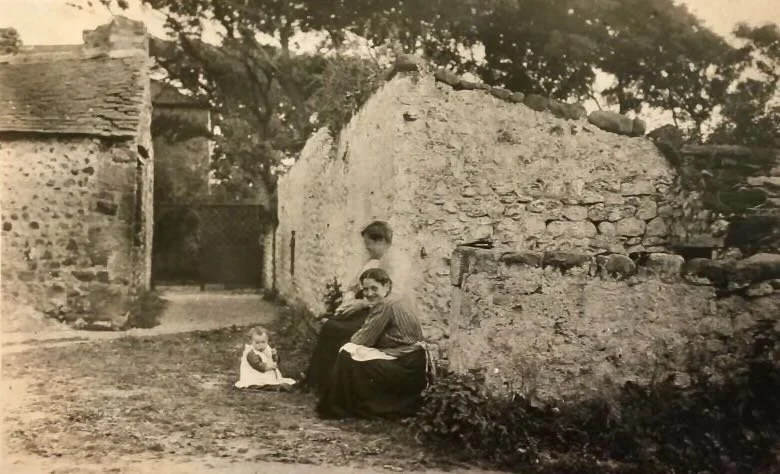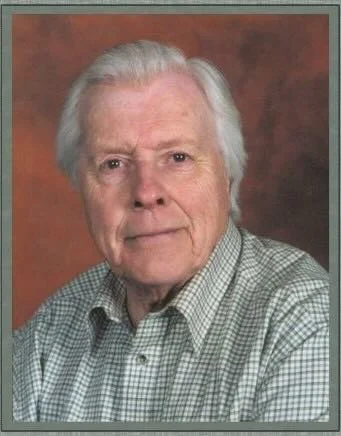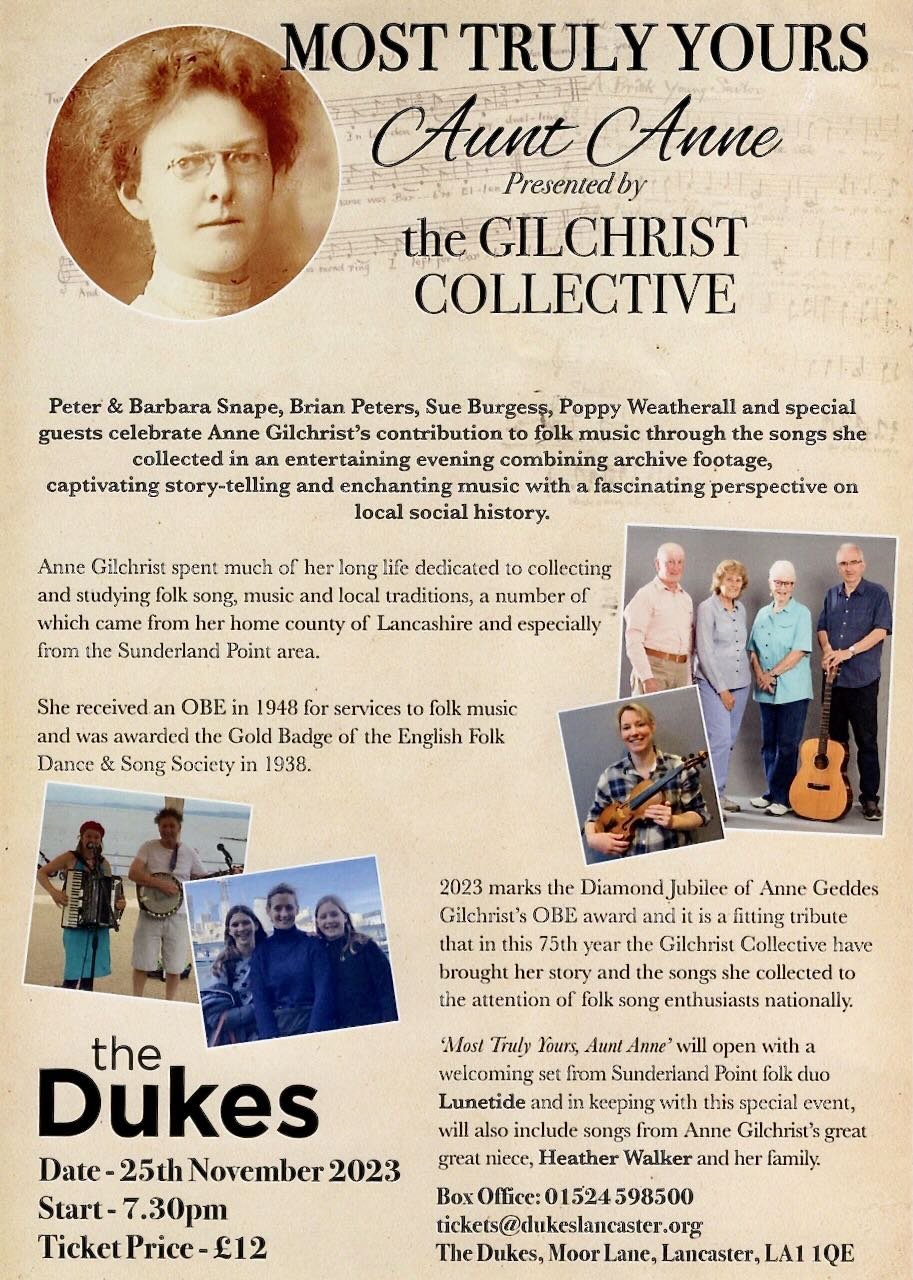The Overture ‘Sunderland Point’
Yes, there really is one, and it came as a surprise to us when we read the email. The information comes from no less an authority than Peter Snape of the Gilchrist Collective who wrote the fascinating article on the life of Anne Gilchrist last March click here to read
We urged Peter to tell us more about it. Unfortunately, it doesn’t seem to have been much performed, there is no recording on Spotify or YouTube, but it genuinely does exist and has its origins at Sunderland Point and starts with Mrs Bowker in 1909.
Mrs and Mrs Bowker c1900. Courtesy the Gilchrist family.
In this remarkable hand-coloured photograph taken by George Gilchrist we see the Bowkers in a horse and trap outside number 14. We know the photo must be before 1908 as the distinctive porch and bay window have not yet been installed.
In Peter’s notes we read that James Bowker was born into a farming family in Yorkshire and had moved to Sunderland Point in 1895 to take over Point Farm (as it was known then, subsequently Hall Farm) based at number 14. His wife, Elizabeth Jane Bowker (nee Kitchen) was born in 1859 into the centre of working-class life in Liverpool the daughter of a Cotton Porter. While still young, she and the rest of her family were boarding in a household of 12, the home of Danish and Irish parents.
After a period in domestic service in Huddersfield she met James Bowker, and they were married in Warton parish church in June 1884. By the time James and Elizabeth arrived at the Point they had had four children.
They left Sunderland Point in 1912 and moved to a farm in Tatham, some 11 miles northeast of Lancaster they had, during the 17 years of living here, put down deep roots that survive to the present day.
In 1906, their eldest child, Margaret Annie, married Wilton Gardner who lived close by in the ‘Large House’ on First Terrace (number 9). They lived for a short time in Point Farm before moving to Lancaster. Wilton is the great uncle of Stephen who lives on the Point.
In 1918, the youngest of the Bowker children, William (known as Billy) married Doris Smith, the daughter of Tom and Isabella Smith and big sister to Bert Smith who were living in Cotton Tree Cottage. Doris is aunt to Alan and great-aunt to Philip, both of whom are also residents of Sunderland Point.
In the photograph below we believe it to be Ann Gardner (Wilton’s mother) behind, with Elizabeth Bowker facing, and (probably) baby William seated. Wilton Atkinson’s note on the back says the picture was taken at the rear of Second Terrace.
Mrs Bowker and Mrs Gardner c1895: From the collection of Wilton Atkinson
Perhaps having a natural musical sense Mrs Bowker had memorised numerous songs of inner-city Liverpool as well as of rural life in northern England. It is our good fortune that she met the premier collector of Lancashire songs and folklore of those years, Anne Gilchrist, during her frequent visits to the Point.
One of these songs, sung by Mrs Bowker to Anne in 1909, was SHULE, SHULE, a copy of which has been provided by Peter.
This brief, simple song provided some of the inspiration for the modern composition ‘Sunderland Point’. Two other songs collected locally by Anne were additional sources.
Peter kindly provides further details about this important composition and his journey of discovery
*
The Overture ‘Sunderland Point’.
When researching Anne Geddes Gilchrist, I was shown a newspaper article tucked away in the Gilchrist Family archive. I was immediately ‘hooked’ and spent a considerable amount of time finding out more, which proved to be far more onerous and time consuming that at first thought.
The article was from the (Lancaster) Guardian, 17th October 1969, with the following headline, ‘Celebration Overture opens first season in University’s new hall’.
The concert, which had been held the previous week, on 9th October 1969, was performed by the Ulster Orchestra and the overture, which had, according to the report, opened the evening in a ‘fitting way’, had been composed by John Manduell, and was called ‘Sunderland Point’.
The programme for the evening was a simple folded sheet costing sixpence and contained these notes for the overture written by John himself.
This short work was written in August as a pleasant change from working on two more extended commissions. When I was asked to write a work with which the Ulster Orchestra could introduce this first international season of concerts, I thought it would be appropriate if I were to try to give such a work a distinct Lancaster (not just Lancastrian) flavour. I was delighted to find a number of folk songs collected near Lancaster. Three of these appealed to me particularly and, by happy coincidence, all three proved to be songs which Anne Gilchrist has taken down as they were sung to her on her visits to Sunderland Point on the Heysham peninsula. It is round these three folk songs that my overture is built.
The first to appear (violins) and indeed the one which dominates the work is ‘Shule Shule’ sung to Anne Gilchrist by a Mrs Bowker at Sunderland Point in July 1909. It has a melody in the Dorian mode which has a very distinctive flavour. The title was probably a local version of Shula Agra, which may in turn derive from succir agus. The second song used (first heard on bassoon) is in complete contrast, being the version Anne Gilchrist encountered at Sunderland Point of ‘Jolly Sailors’, a tune which has also cropped up in slightly different versions at places as far apart as Brighton, South Elmsall in Yorkshire and Grayrigg in Westmorland. The third song, which simply appears in my overture played by the strings while the wind is busy chattering away with ‘Jolly Sailors’ is ‘Beg Your Leave’, sung to Anne Gilchrist during a visit she made to Sunderland Point at Easter 1906 by the Jolly Boys (also known as the Pace Eggers) from nearby Overton Village.
The overture makes no pretensions at being anything more than a fairly simple and gay piece with these melodic local associations.
The composer - Sir John Manduell 1928 – 2017: Courtesy of Divine Art Recordings (UK)
Sir John Manduell was born in Johannesburg in 1928. He read Modern Languages at Jesus College Cambridge and later won a Performing Rights Society Scholarship for post-graduate studies at the Royal Academy of Music.
He was the first Director of Music at the University of Lancaster (1968 – 1971) after which he commenced his role as Founding Principal of the Royal Northern College of Music (RNCM) in Manchester. As a composer Manduell wrote mostly chamber and orchestral works.
Finally, Peter draws our attention to some disappointing news that might have a silver lining:
After the first performance of the overture on that October night, it has become somewhat elusive and especially so with no professional recording having been made. I have, however, located and viewed the manuscript music for it and more importantly I have found an old reel to reel tape recording in the British Library of the BBC Midland Light Orchestra performing the ‘Sunderland Point’ overture, fifty two years ago in November 1971. I have listened to the overture at the British Library but as the recording remains in copyright with the BBC there is little further that can done to make the recording more widely available. Recently however, I have had some discussion that gives me hope, that someday, we might be able to hear the ‘Sunderland Point’ overture performed live once again.
The Dukes Theatre concert.
By happy coincidence, this coming Saturday (25th November) Peter and the full Gilchrist Collective will be performing at the Dukes Theatre in Lancaster. Supporting the concert will be Point residents Jo Powell and Scottie Wilson performing as Lunetide. Anne’s great great niece Heather Walker and her daughters will also be performing.
Here's the flyer for the event.




